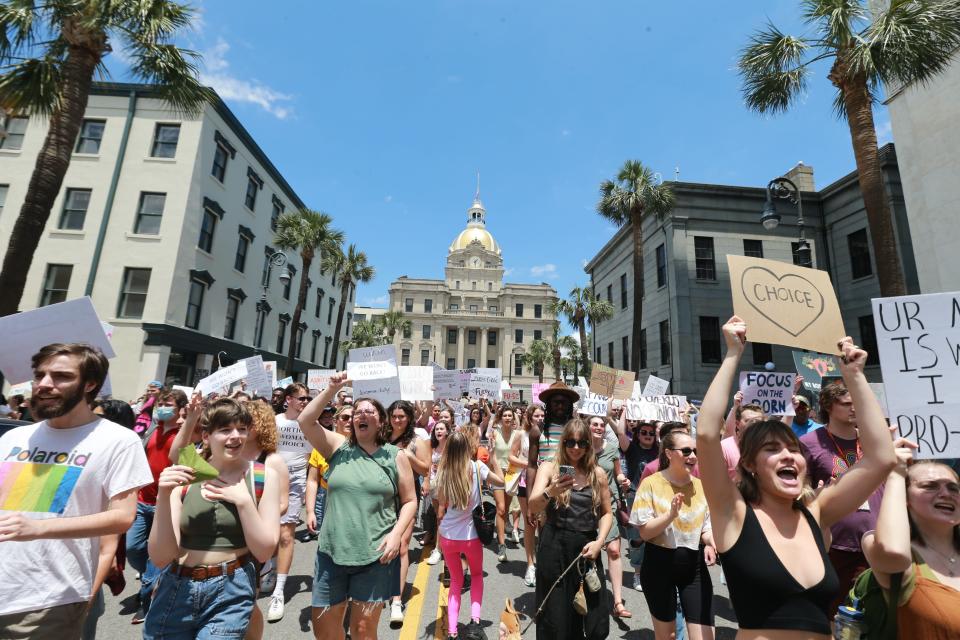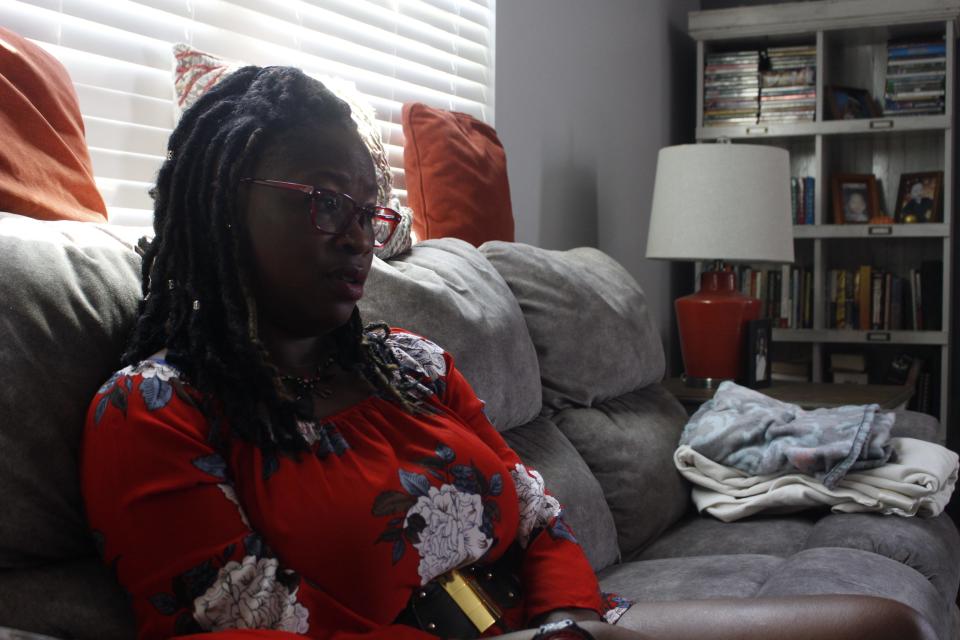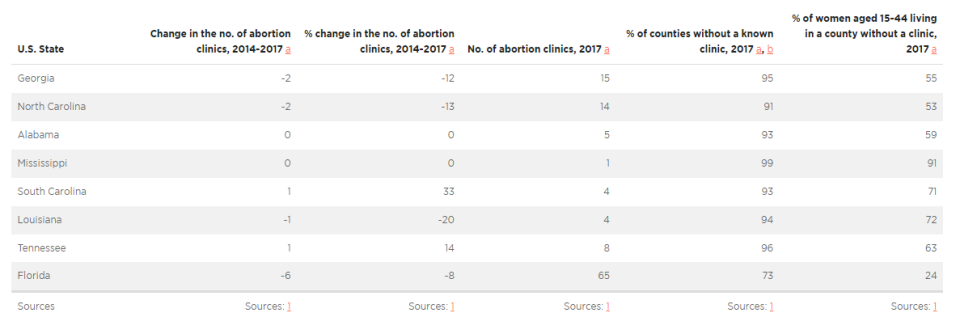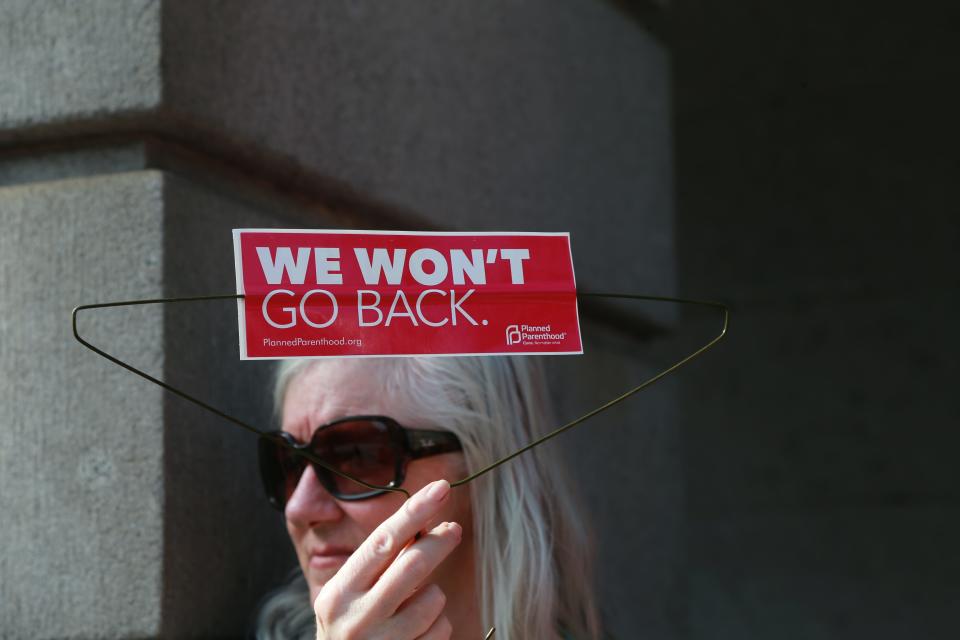Shrinking abortion access in a post-Roe society will harm the most marginalized in Georgia
Tenee Baker had a month before her deployment. The 23-year-old was serving at Fort Lewis (now Lewis-McChord) in the state of Washington in 2003, when the U.S. had just invaded Iraq.
Uncertainty swelled in Baker who had served in reserve status until then, but she was ready.
As part of her preparations, Baker was to receive a set of inoculations before shipping out. She walked into her post’s medical center. Above the doorway was a sign with bold lettering, “If you think you are pregnant, do not take any of these shots.”
“It didn’t even enter my mind,” said Baker. She and her boyfriend were using contraceptives.
Abortion law changes ahead: Here's what would happen in Georgia if Roe v. Wade is overturned
Related: Georgia Republicans applaud possible repeal of Roe v. Wade, Democrats call for federal protections

But a few days later, Baker noticed her period was late and took a pregnancy test from a local drug store. It was positive.
“I was terrified,” Baker recounted. “You could not guarantee there wasn’t going to be complications because of these shots.”
She and her boyfriend both decided it would be best to terminate the pregnancy. Yet, instead of being met with support from her chain of command, her superiors had tried to convince her to reconsider.
They were imposing their personal beliefs onto her, Baker said, but she had made up her mind about what was best for her health and for her career.
She terminated the pregnancy at exactly six weeks and, 10 days later, deployed to Kuwait.
Almost two decades later, Baker, now a mother of two children, recounts her story like it was yesterday. She said what happened to her should never happen to anybody.

“A government entity should never have told me what to do with my body,” Baker said.
But with Roe v. Wade overturned, the 1973 ruling that made abortion a constitutional right, abortion restrictions will become the purview of the states. And Georgia, where Baker lives now, will likely outlaw abortions after the six-week mark with some exceptions.
In Georgia, about 43% of abortions are performed within the six-week gestational period, in line with national statistics. Baker said she struggles to comprehend how the other 57% will fare in a post-Roe world.
"I am angry, hurt and in shock," said Baker, "I'm worried about the safety of future generations who are now being told what to do and limiting us as if we do not matter."
Shrinking abortion access
Since moving to Savannah, Georgia, Baker has paid close attention to the state of reproductive care and healthcare in general for people like her. What she found is that being pregnant and Black can be fatal.
“The system is broken and it’s even worse down here, especially for women of color,” said Baker, "As a woman of color, SCOTUS put me more at risk."
A majority of abortion seekers in the U.S. are made up of lower income people of color in their 20s. Most already have a child.
Black women in Georgia make up the majority of abortion seekers at 65%, compared to 38% nationwide. Coupled with Georgia’s staggering maternal mortality rate, cutting access to abortion could present a crisis for Black women, said ACLU Georgia Director Andrea Young.
According to the ACLU, the maternal death rate for white women in Georgia is more than twice that for white women nationally. The maternal death rate for Black women in Georgia is twice that for white women in Georgia and six times the rate for white women, nationally. That's 47 deaths per 100,000 live births for Black women. Georgia’s own health experts believe that more than half of those pregnancy-related deaths are preventable.
“This will only increase if people are being forced through pregnancy,” said Young.
Georgia’s healthcare landscape and social safety net provides very little comfort to marginalized groups who will have to go through with a pregnancy.
Less than half of Georgia counties have access to OBGYN care. And 60 out of Georgia's 159 counties have no pediatrician. In the nation, Georgia ranks 46th in childcare and young children’s education programs, according to a 2020 report commissioned by the ACLU Foundation of Georgia.
'This is a people issue': Crowd rallies in downtown Athens in support of abortion rights
'We will not go back': Abortion-rights activists rally at Augusta Common
Georgia Life Alliance, a leading pro-life group in the state, say that certain provisions of HB481, the so-called heartbeat bill, will actually expand protections for women.
Martha Zoller, executive director of Georgia Life Alliance, noted in an opinion piece for the Atlanta Journal Constitution that the “Heartbeat Bill” yields several benefits by recognizing personhood in the womb: providing a preborn child tax exemption on state income taxes, and expands civil legal protections for pregnant women who lose their unborn baby due to negligence from others.
Zoller believes that, contrary to what abortion advocates say about anti-abortion activists, GLA is creating a better world for women. The GLA was instrumental in lobbying for Betsy’s Law, a bill signed by Gov. Kemp this year that will allow nonprofits to establish free maternity supportive housing and resources for pregnant and postpartum women.
“I think what we’re trying to do is focus on strength for women and protecting babies,” said Zoller.
An uncertain future
Across the nation, 89% of U.S. counties did not have abortion clinics, according to 2017 data from the Guttmacher Institute. In Georgia, that number was 95%.
Yet, with about 15 abortion clinics (most of which are concentrated in the metro Atlanta area), Georgia is considered a “safe-haven” for abortion seekers in the South.
“In many southern states, they’re down to one or two clinics,” said Young.

In Mississippi, there’s only one – Jackson Women’s Health Organization, the clinic at the center of the Dobbs v. Jackson case that determined the fate of Roe in the Supreme Court decision.
The overall number of abortion clinics in the U.S. have declined over the years. However, it’s important to note that not all abortions are carried out in clinics. People who are insured can seek out an abortion with a private provider. But in Georgia, 1 in 5 women of childbearing age are uninsured and Medicaid only covers abortions in cases of life endangerment, rape or incest.
“The utilization of a clinic is often for people who don’t have a private provider,” said Young.
The cost of an abortion depends on the stage of pregnancy. Most abortions occur within the 13-week period and can cost between $400-$600 in Georgia without insurance.
Medication abortion or the abortion pill, taken up to 10 weeks of pregnancy, now account for more than half of U.S abortions, according to the Guttmacher Institute.
Whether that access will be protected in the future hangs in the balance. Efforts to roll back use of the abortion pill through telemedicine flared up in the Georgia legislature earlier this year, but ultimately did not pass.
Abortion providers and advocates across the state struggle to anticipate what other barriers patients may have to face now that state legislatures are free to impose further restrictions.
The Feminist Women’s Health Center in Atlanta has continuously seen a high volume of patients, being one of the few clinics that offers abortion services up to Georgia’s 20-week mark. Come July, though, the clinic's director, Bekele, said they’re anticipating an influx of patients from surrounding states that plan to further restrict abortion access.
Bekele, who chose only to use her last name for this story due to safety concerns, has already seen patients overcome the various barriers surmounted against them.
“Not everyone has the resources to travel,” said Bekele, who adds she’s seen at least one patient stay in her car overnight to wait out the 24-hour waiting period mandated in Georgia. “People kind of just suck it up and say, ‘This is what I have to do.’ And to think everyone is going to have to be doing that now...”

A return to the past?
Marilyn Michaels, who currently resides in Savannah, remembers when she had her abortion long before Roe v. Wade existed. It was in 1956 and she was a freshman in college in New Jersey when she became pregnant. She couldn’t tell her staunchly religious family her circumstance and, instead, went to her future father-in-law for help.
“I was blindfolded and driven by an unknown man to a house about 45-minutes away,” recounts Michaels, “I remember going up a long flight of stairs into a kitchen and was told to get up on the table where a woman opened a dirty towel.”
When the procedure was over, Michaels was told to go home and walk until the fetus was expelled. She did as she was told, but over the next several days, she hemorrhaged to the point of hospitalization.
“Somehow I got myself to the infirmary … they called an ambulance and rushed me to the local hospital where they saved my life,” said Michaels.
Michaels said she’s scared what will happen to women now. She survived then, but not everyone in her position did. She’s disturbed by the thought that women will, once again, have to put their life in danger to seek out an abortion.
As a provider, Bekele has the same fear.
“It’s going to be very dangerous ... women are going to be doing things to themselves,” Bekele said. “We just don’t know.”
This article originally appeared on Savannah Morning News: Abortion access in GA: Who will be affected with Roe v Wade overturned?

